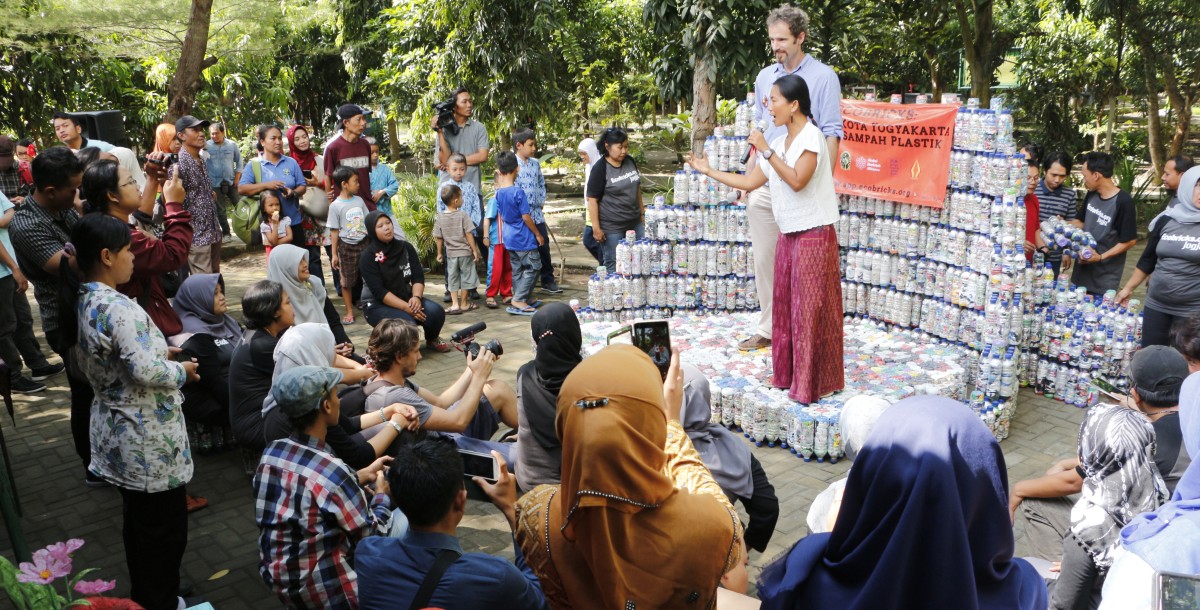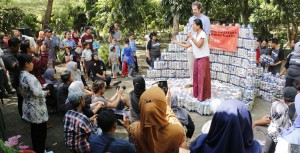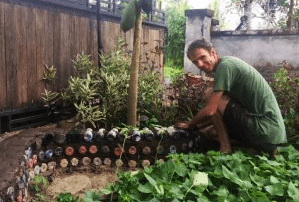My work sharing ecobricks in Indonesia has been super charged this year through my partnership with Ani Himawati. A movement has been ignited in Jogjakarta which now has a life and unfolding of its own. Tens of thousands of people, soon to be in the hundreds of thousands, are now ecobricking their plastic.
Our partnership isn’t just incidental. It’s been fundamental. After all, we are not just showing a solution, we are being it. The way that we, men and women, get along these days is perhaps the most important thing– on Earth. Literally. A harmonious synergy of the masculine and feminine in ourselves, relationships and leadership is essential to authentically regenerating a thriving and harmonious synergy with each other and the ecosystems that we are part of. For me this is even more important than packing the plastic.
In a recent meeting with the Jogja city government in which we were arranging a public presentation, I had to correct their agenda. It wasn’t “Russell Maier” speaking. It was “Russell Maier and Ani Himawati”.
The omission can be well understood. For a long time men have been ‘leading the charge’. However, if it were just I, a man, leading in the old way, the entire movement would have a different energy and pattern. I would go so far to say that, it would risk being the same pattern that has created all the plastic pollution in the first place. Just as the way you say something is often more important than the words themselves, the way that one leads if often more important than the cause itself.
Let me explain what I mean.
The traditional masculine mode of making and leading (whether it’s building a sky scraper, a nation, or a house from bamboo) has dominated the world for a long time. With the ecobrick movement, Ani and I, are dealing with plastic pollution. Plastics and the system that has spawned it, are an unbalanced, exploitative dynamic that finds its root in this domination of the masculine. It’s an entrenched dynamic that runs deep. And it goes back centuries.
Our exploitive relationship with the biosphere wasn’t yet obvious 400 years ago. But we were on our way. The First Nation people in the Americas, watching the Europeans settle, they could see it coming. Today, one can sure see it: Just look at that piece of plastic on the beach or the smouldering dump site outside of your city. These are signs that something is wrong with our culture and way of being. These are the toxic symptoms of a systematic, and deep rooted, gender imbalance in general world culture.
The masculine, the patriarchy, has ruled over the feminine for a long time. The balance of yin and yang has been skewed. Where this imbalance finds its root is a big topic– but it’s safe to say we can trace it to religious stories– such as the personification of god as a male. Through this imbalance (there was no goddess to balance it out) the masculine virtues of the time, power, competition, dominance, strength and conquest came to be over-celebrated. Inexorably, these characteristics came to be lodged in our cultures as ideals that we have long since stopped questioning. Women came to be dominated and subjugated by men in these societies. The values of the feminine were repressed and shunned.
Likewise, we strove to dominate and subjugate Nature. Tellingly, the concept of ‘Nature’ in our cultures is often represented by a woman. It is important to ask ourselves what exactly we mean when we refer to ‘nature’ today’. It’s telling that the word and the concept are part of the deep rooted imbalance– the very concept that we have of Nature is man-made and skewed. The idea of “Nature” is of something separate from mankind, from the civilized, from ‘us’. In this way, homo sapien-centric way of seeing the world, an island without any humans is “natural” but as soon as it is inhabited it is not. This definition of Nature is entirely anthropocentric. Its plays into the old idea of man dominating something other than himself. It is a vain and flawed attempt to put us above everything else in the biosphere.
From this invisible imbalance entire cities have been built, civilizations powered, and economies defined. We’ve thus dominated ecosystems, conquered mountains and forests, lakes and rivers with axes, dams, fields and mines. And from this clear-cut, Competition has a purported virtue has flourished (i.e. Man vs Nature, us vs them). It’s a virtue that makes perfect sense in the paradigm of subjugation, separateness and domination. This masculine ideal of outdoing others it has run rampant in our lives, sports, projects, and economies surreptitiously contaminating all like a syrupy soft-drink poison.
It’s a little hard to write about what is a masculine virtue, because of course, it doesn’t have to be this way. To be a man, one doesn’t have to fight, win, dominate, or be the strongest. And in fact, in our current time and place, it’s fundamentally essential that this not be so. In the face of the pandemic ecological challenges of our age, the way that we work together, men and women, must evolve. The requisite evolution is especially visible for men, but also the case for women who can just as easily wrapped up in the old paradigm.
We cannot solve anything in the same masculine mode that created the problem in the first place. One may build a hundred bamboo houses, pick up a thousand pieces of plastic, recycle a million bottles and in fact be still firmly entrenched in the very pattern at the root of the exploitation of our planet’s biosphere.
I see the legacy of these old masculine values all the time in my work with Ecobricks. At a talk I once gave the organizers unfurled a giant banner “Russell’s War on Waste”. Often, I encounter environmentalists with a singular crusade against plastic. With our work sharing ecobricks in communities, social saturation comes about because of a largely female charged collaborative movement. At this point, a politician (it’s always been a man) steps in and announces a Competition. When hundreds of people are making ecobricks enthusiastically, someone will suggest that a machine could be made to do it more efficiently.
On the surface, these things may seem innocuous, benevolent even. But I assure you, they are in direct contradiction to the consciousness shift that makes any ecological movement successful and important.
The deep healing and regenerative shift is about finding harmony with the cycles of life rather than a ‘war’ against something. It’s about embracing a situation and substance rather than condemning or banning it. It’s about working together rather than competing against each other. It’s about collaboration and beauty as motivators– rather than doing something to be the best, we do it to make one’s community a better place. It’s not about constructing Big things, it’s about building sanely in a way that serves the community and ecosystem. It’s not about finding the most efficient way achieve a goal (i.e. with a technological innovation or machine), it’s about a understanding that the process is more important than the goal. It’s about transcending the old story that we are above the biosphere and living with the new, knowing that we’re fundamental, inextricable threads in the pulsating Gaia tapestry.
When Ani and I present ecobricks together, we’re not just communicating in two languages. Each of us brings our unique energies to the unfolding. As you can tell by this little essay, my contribution leans to the philosophical and theoretical side. Meanwhile, Ani connects emotively and intellectually with the audience and the neighbourhood’s men and women with her casual charm. Simply by default of being a tall white male from North America, people will pause and give a default respect for my ideas. Simply by speaking Javanese and Indonesian fluently, Ani can connect and charm our audiences. It’s a remarkable and blazingly unique combination of strengths, that works to great effect to inspire.
We may be talking about Ecobricks, but what we’re showing and being is far more important: Two different people, of two different genders, ethnicities and cultures, taking a passionate and unified public stand. It’s a phenomenon that is happening more and more these days and it heralds a healing shift not only in our interpersonal relationships, but in our relationship with “Nature”. The walls of the old paradigm fall down and we see that we’re all in it together with plants, frogs, and all our fellow species. Rather than the division, competition and domination that has characterized the past age, we’re moving into a harmonious acknowledgement and balance of our respective energies, ways and powers.
There is nothing more important. And, there’s nothing more potent and powerful than a harmony of masculine and feminine to regenerate a harmony amongst us all, our fellow species and the web of life that we are immersed. In the words of Pierre Teilhard de Chardin:
“Someday, after mastering the winds, the waves, the tides and gravity, we shall harness for God the energies of love, and then, for a second time in the history of the world, man will have discovered fire.”
—-
Russell Maier and Ani Himawati use the principles of mandalic cocreation to help orchestrate the Ecobrick movement. Read more of Russell’s work and philosophy on http://www.Patreon.com/russs and http://www.Russs.net
More of my writing on Plastic and Waste
[fbcomments]
Steemit Upvote:



